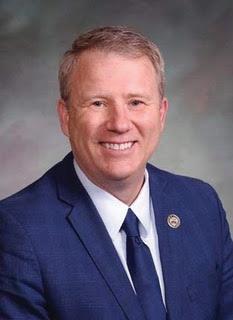
3 minute read
Reducing barriers to mental health treatment
Growing up in rural Iowa, mental health struggles were not something we spoke about openly or took seriously in any way. Most of my time outside school was spent working or playing sports, and there was never any time to address mental health — there was always something “more important” that needed to be taken care of.
It was especially unheard of at the time to think that a mental illness could be just as disabling as a physical injury.
I have struggled with suicidal thoughts since I was 9 years old and went without any sort of professional care or treatment for over two decades. From my experience, I know that professional intervention can have life-changing results, and one of my priorities as a legislator has always been to ensure those su ering from mental illnesses are able to access care that is as high quality as it is a ordable.
To further this goal, I was a prime sponsor of SB154 in 2021, which established a 988 Suicide Prevention Lifeline in Colorado to coincide with the federal launch in July 2022. For these e orts, I had the honor of being named a legislative champion by Mental Health America.
But there is always more to be done in correcting the healthcare gap between mental and physical illnesses. HB23-1130 is a bill currently gaining traction in our state legislature that is looking to reduce the amount of time between a patient with a serious mental illness (SMIs) being prescribed personalized treatment and when they are able to a ord it and actually begin receiving this form of care. is delay is primarily caused by “step therapy,” which is a treatment ap-
LINDA SHAPLEY Publisher lshapley@coloradocommunitymedia.com
MICHAEL DE YOANNA Editor-in-Chief michael@coloradocommunitymedia.com
THELMA GRIMES South Metro Editor tgrimes@coloradocommunitymedia.com proach used by health plans to keep medication costs low. e bill does not eliminate step therapy altogether, as it recognizes
When a patient is prescribed a drug by their doctor, their health insurance provider or Medicaid will have them try lower-cost medications rst to determine if they will be e ective at treating the patient’s condition. If those treatments don’t work, the patient can “step up” to the potentially more expensive treatment originally recommended by their doctor. HB1130 recognizes the signi cant harm that a patient may experience as a result of this delay by seeking to limit its use when treating SMIs.
When HB1130 passed the House with an overwhelming majority vote and show of support from lawmakers with 39 representatives signing on as cosponsors, I knew I wanted to do everything in my power to ensure a similar result in the Senate. A rst “step” was signing on as a prime cosponsor.
CHRISTY STEADMAN Editor csteadman@coloradocommunitymedia.com
LINDSAY NICOLETTI Operations/ Circulation Manager lnicoletti@coloradocommunitymedia.com
ERIN ADDENBROOKE Marketing Consultant eaddenbrooke@coloradocommunitymedia.com that insurers need to keep initial costs low to serve a greater number of patients. HB1130 remedies existing step therapy laws to allow patients with SMIs to try only one drug before they will receive insurance coverage for the prescribed drug.
Additionally, HB1130 does not lessen step therapy requirements for all Coloradoans with a mental illness, and rather focuses on those with severe mental illnesses that are impacted the most by delays to the most e ective treatments.
As a lifelong advocate for behavioral health being accessible to all who need it, I am proud to be a prime co-sponsor for HB1130. is legislation is a leap forward in recognizing that mental illnesses can be as debilitating as physical illness, and require the same high-quality, a ordable, and individualized care as any other health condition.
Chris Kolker is the Colorado State Senator for District 16 in Centennial.

Columnists & Guest Commentaries
Columnist opinions are not necessarily those of the Herald-Dispatch. We welcome letters to the editor. Please include your full name, address and the best number to reach you by telephone.
Email letters to letters@coloradocommunitymedia.com
Deadline Wed. for the following week’s paper.
Denver Herald-Dispatch
She was invited to speak at her rst women’s conference. Although Carolyn was excited about the opportunity to nally be invited to share her story, she was petri ed of speaking in public. Without a real opportunity to speak that was immediately in front of her, she would dream about one day becoming a speaker. She could see herself on stage wowing the audience.
But now, it suddenly became very real for her, and with each passing day, her panic levels increased. She couldn’t eat, she couldn’t sleep, and she couldn’t focus on her full-time job. And sadly, a week before she was scheduled to speak, she backed out of the event.
Allen is in sales. Allen is having a very di cult beginning to his year as his numbers are way o . He has heard the word “no” so often already this year that he has developed a fear of asking the prospect for the business. Before each call he began thinking to himself, “ is prospect will just say no too.” He decided he would rather just not ask for the business, hoping they would ask him










